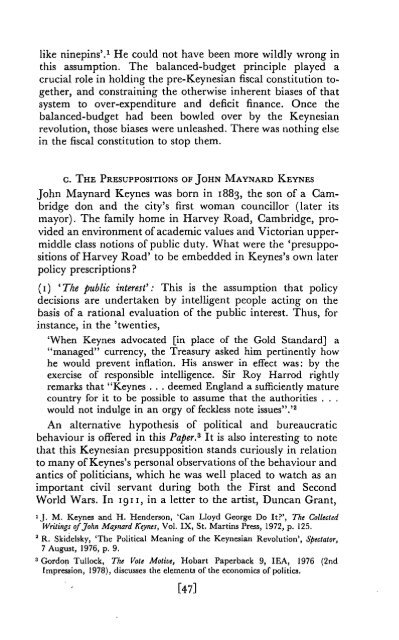THE CONSEQUENCES OF MR KEYNES.pdf - Institute of Economic ...
THE CONSEQUENCES OF MR KEYNES.pdf - Institute of Economic ...
THE CONSEQUENCES OF MR KEYNES.pdf - Institute of Economic ...
Create successful ePaper yourself
Turn your PDF publications into a flip-book with our unique Google optimized e-Paper software.
like ninepins'. 1 He could not have been more wildly wrong in<br />
this assumption. The balanced-budget principle played a<br />
crucial role in holding the pre-Keynesian fiscal constitution together,<br />
and constraining the otherwise inherent biases <strong>of</strong> that<br />
system to over-expenditure and deficit finance. Once the<br />
balanced-budget had been bowled over by the Keynesian<br />
revolution, those biases were unleashed. There was nothing else<br />
in the fiscal constitution to stop them.<br />
c. <strong>THE</strong> PRESUPPOSITIONS <strong>OF</strong> JOHN MAYNARD <strong>KEYNES</strong><br />
John Maynard Keynes was born in 1883, the son <strong>of</strong>a Cambridge<br />
don and the city's first woman councillor (later its<br />
mayor). The family home in Harvey Road, Cambridge, provided<br />
an environment <strong>of</strong> academic values and Victorian uppermiddle<br />
class notions <strong>of</strong> public duty. What were the 'presuppositions<br />
<strong>of</strong> Harvey Road' to be embedded in Keynes's own later<br />
policy prescriptions?<br />
(1) ' The public interest': This is the assumption that pohcy<br />
decisions are undertaken by intelligent people acting on the<br />
basis <strong>of</strong> a rational evaluation <strong>of</strong> the public interest. Thus, for<br />
instance, in the 'twenties,<br />
'When Keynes advocated [in place <strong>of</strong> the Gold Standard] a<br />
"managed" currency, the Treasury asked him pertinently how<br />
he would prevent inflation. His answer in effect was: by the<br />
exercise <strong>of</strong> responsible intelligence. Sir Roy Harrod rightly<br />
remarks that "Keynes . . . deemed England a sufficiently mature<br />
country for it to be possible to assume that the authorities . . .<br />
would not indulge in an orgy <strong>of</strong> feckless note issues".' 2<br />
An alternative hypothesis <strong>of</strong> political and bureaucratic<br />
behaviour is <strong>of</strong>fered in this Paper. 3 It is also interesting to note<br />
that this Keynesian presupposition stands curiously in relation<br />
to many <strong>of</strong> Keynes's personal observations <strong>of</strong>the behaviour and<br />
antics <strong>of</strong> politicians, which he was well placed to watch as an<br />
important civil servant during both the First and Second<br />
World Wars. In 1911, in a letter to the artist, Duncan Grant,<br />
!j. M. Keynes and H. Henderson, 'Can Lloyd George Do It?', The Collected<br />
Writings <strong>of</strong> John Maynard Keynes, Vol. IX, St. Martins Press, 1972, p. 125.<br />
2 R. Skidelsky, 'The Political Meaning <strong>of</strong> the Keynesian Revolution', Spectator,<br />
7 August, 1976, p. 9.<br />
3 Gordon Tullock, The Vote Motive, Hobart Paperback 9, IEA, 1976 (2nd<br />
Impression, 1978), discusses the elements <strong>of</strong>the economics <strong>of</strong> politics.<br />
[47]












